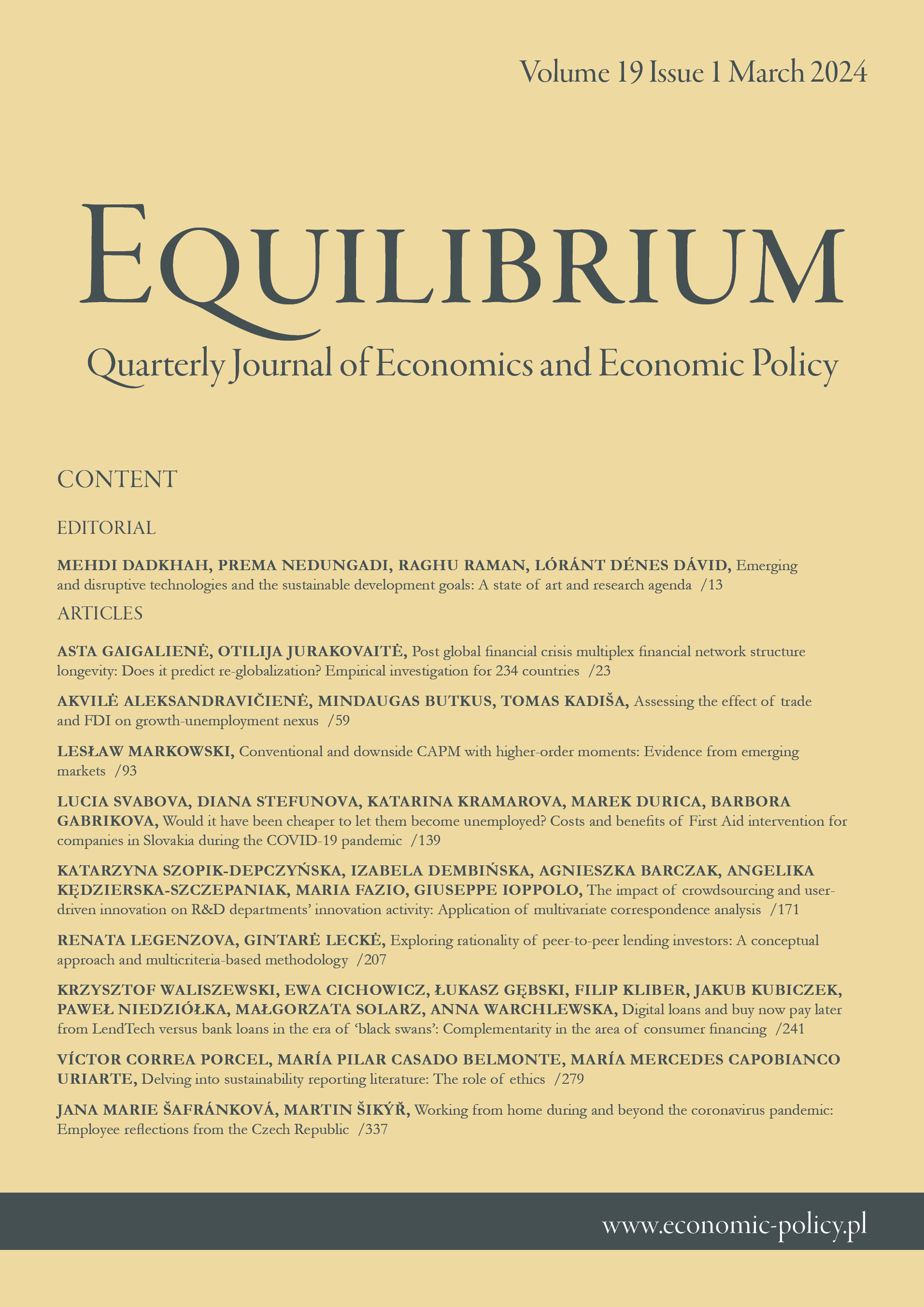Can the Implementation of the Europe 2020 Strategy Goals Be Efficient? The Challenge for Achieving Social Equality in the European Union
IF 6.2
Q1 ECONOMICS
Equilibrium-Quarterly Journal of Economics and Economic Policy
Pub Date : 2017-09-30
DOI:10.24136/EQ.V12I3.20
引用次数: 35
Abstract
Research background: Economic crisis hit all the European Union Member States hard, with the impact of crisis varying considerably. The low growth performance in the EU has increased concerns regarding an increasing wage dispersion, income inequality at large, and social exclusion in line with poverty. Inequality should be seen as a cornerstone of both sustainable and inclusive growth under the Europe 2020 Strategy. Social inequality in the EU is a real problem, which hampers sustainable economic growth. Purpose of the article: The purpose of this study is to introduce evaluation of social development convergence and divergence trends between the EU Member States in the context of the Europe 2020 Strategy. The study gives an outline of the issues of the labour market and income disparities and poverty. Policymakers must be clear about what social objectives they are aiming to achieve, therefore special attention is paid to headline national goals of the Europe 2020 Strategy. Methods: The main task of this study is to assess social dimension and inequalities problems in the EU27 by applying Data Envelopment Analysis method, resp. time-series dynamic efficiency analysis in the form of output-oriented Malmquist Productivity Index. This study contains changes of key social equality indicators related to the Europe 2020 Strategy and compares objectives and general outlines of period 2010-2015, as well as the impact on national economics and living conditions. Findings & value added: Results contain elements of typology premises of the EU28 and point to a large diversity in inequality patterns, as the Author observes both increases and decreases in inequality at the EU level. Recent changes in social inequality have been associated with the business cycle, particularly with the accessibility of the labour market and, of course, with income inequality. Additionally, the development challenges are discussed for improvement of the socioeconomic well-being of the EU and to avoid social disparities.欧洲2020战略目标能否有效实施?欧盟实现社会平等的挑战
研究背景:经济危机重创了欧盟所有成员国,危机的影响差异很大。欧盟的低增长表现增加了人们对工资分散加剧、收入不平等以及与贫困相关的社会排斥的担忧。根据《欧洲2020战略》,不平等应被视为可持续和包容性增长的基石。欧盟的社会不平等是一个真正的问题,它阻碍了可持续的经济增长。文章目的:本研究旨在介绍在《欧洲2020战略》背景下对欧盟成员国之间社会发展趋同和分化趋势的评估。该研究概述了劳动力市场、收入差距和贫困问题。政策制定者必须清楚他们的社会目标,因此要特别关注《欧洲2020战略》的总体国家目标。方法:本研究的主要任务是分别采用数据包络分析方法评估欧盟27国的社会维度和不平等问题。以产出导向的Malmquist生产力指数形式进行的时间序列动态效率分析。本研究包含了与《欧洲2020战略》相关的关键社会平等指标的变化,并比较了2010-2015年期间的目标和总体纲要,以及对国民经济和生活条件的影响。研究结果和附加值:研究结果包含了欧盟28国类型学前提的元素,并指出了不平等模式的巨大多样性,因为作者观察到欧盟层面的不平等现象有所增加和减少。最近社会不平等的变化与商业周期有关,特别是与劳动力市场的可及性有关,当然也与收入不平等有关。此外,还讨论了改善欧盟社会经济福祉和避免社会差异的发展挑战。
本文章由计算机程序翻译,如有差异,请以英文原文为准。
求助全文
约1分钟内获得全文
求助全文
来源期刊
CiteScore
9.20
自引率
3.50%
发文量
28
审稿时长
36 weeks
期刊介绍:
Equilibrium. Quarterly Journal of Economics and Economic Policy is a scientific journal dedicated to economics, which is the result of close cooperation between the Instytut Badań Gospodarczych/Institute of Economic Research (Poland) and Polish Economic Society and leading European universities. The journal constitutes a platform for exchange of views of the scientific community, as well as reflects the current status and trends of world science and economy.
The journal especially welcome empirical articles making use of quantitative methods in: Macroeconomics and Monetary Economics, International Economics, Financial Economics and Banking, Public Economics, Business Economics, Labor and Demographic Economics, Economic Development, and Technological Change, and Growth.
Current most preferable topics and special issues:
The economics of artificial intelligence: business potentials and risks;
Digitalization and entrepreneurship in economics;
Sustainable socio-economic development, environmental and ecological economics;
Transition in the energy market (improving energy efficiency, alternative energy sources, renewable energy, energy security).

 求助内容:
求助内容: 应助结果提醒方式:
应助结果提醒方式:


